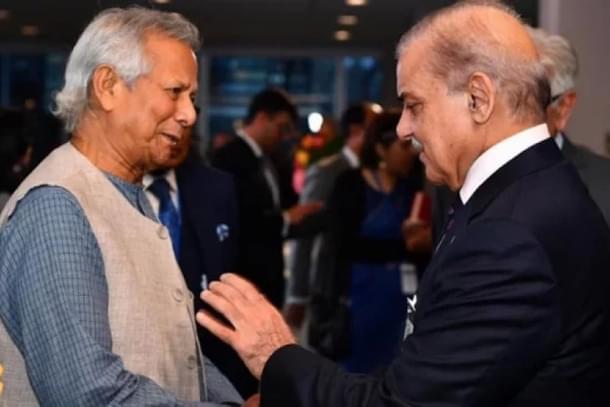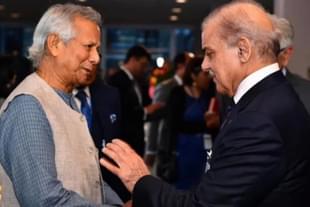World
A New Pakistan-Bangladesh Nexus, Spurred By China, Could Spell Trouble For India
Jaideep Mazumdar
Sep 27, 2024, 05:59 PM | Updated 05:58 PM IST
Save & read from anywhere!
Bookmark stories for easy access on any device or the Swarajya app.


A new nexus between Bangladesh and Pakistan is emerging on the horizon, and it does not bode well for India.
After the fall of the Sheikh Hasina government, Bangladesh has started gravitating towards Pakistan. Pro-Pakistani elements in the country’s bureaucracy, civil administration, armed forces and civil society as well as the pro-Pakistani Islamists in Bangladesh have started steering the country close to Pakistan.
A manifestation of this grand project to bring Bangladesh close to its erstwhile ‘enemy’ was the meeting between the head of Bangladesh’s interim regime, Mohammad Yunus, and Pakistan Prime Minister Shahbaz Sharif at the UN headquarters in New York earlier this week.
Yunus embraced Sharif, thus creating history. Ever since the formation of Bangladesh in 1971, no Bangladeshi leader has ever embraced a Pakistani leader in public, and that too so warmly.
Sharif and Yunus reportedly discussed steps that would be taken to bring their two countries close to each other. Yunus also used his meeting with Sharif to send out a hostile message to India: he called for the revival of South Asian Association for Regional Cooperation (SAARC).
New Delhi has sidelined SAARC, which includes Pakistan, over the latter’s export of terror to India. Instead, India has floated new regional groupings like BBIN (Bangladesh, Bhutan, India, Nepal) that exclude Pakistan.
A call for revival of SAARC by Yunus in the presence of Sharif was definitely an unfriendly act meant to rile India and please Pakistan.
Sharif, on his part, underlined the importance of reviving ties with Bangladesh and called on Yunus to “open a new page” in bilateral relations. The two also pledged to “enhance cooperation in various aspects”.
The Yunus-Sharif bonhomie has been supplemented by calls from some prominent Bangladeshis —former diplomats, retired army officers, academics and others — who are close to the present regime for establishing military ties with Pakistan.
Pro-Pakistani Islamists in Bangladesh, especially the Jamaat-e-Islami Bangladesh, have always stood for close ties with Pakistan. Sheikh Hasina kept these elements at bay. But after her downfall, they have reared their heads and are actively working towards allowing Pakistan to re-establish its presence in Bangladesh.
According to Indian strategic analysts, China is playing a critical role in nudging Bangladesh towards establishing good relations with Pakistan.
After Sheikh Hasina’s ouster, China has been able to increase its influence in Bangladesh, especially in the country’s foreign policy and security establishments.
“Over the years, China has successfully wooed and created a powerful lobby within Bangladesh’s armed forces, bureaucracy, foreign ministry and civil society. This lobby is now actively collaborating with the pro-Pakistani elements within the country to forge close bonds with Pakistan, a client state of China,” said a retired diplomat who served in a senior position in the Indian High Commission a decade ago.
It is, he added, in China’s interests to bring Dhaka and Islamabad close to each other. “Close Bangladesh-Pakistan ties will help Pakistan regain the influence in Bangladesh that it lost after Sheikh Hasina returned to power in January 2009,” he said.
Under military rulers and also when the BNP (Bangladesh Nationalist Party) was in power in Bangladesh, Pakistan’s ISI (Inter-Services Intelligence) played an active role in sponsoring anti-Indian activities in Bangladesh.
The ISI aided, armed and trained militant outfits of North East India who were provided shelter in Bangladesh. Sheikh Hasina put a stop to all that by dismantling the ISI network in her country and banishing Indian militants from Bangladeshi soil.
“Islamabad is, once again, salivating at the prospect of using Bangladesh to carry out anti-Indian activities. While militancy in North East India is all but dead, Pakistan hopes to use radical Islamist groups and Islamic terror groups in Bangladesh to create trouble in India. Pakistan feels that the porous India-Bangladesh border can be easily used to push in well-trained terrorists into India,” said Major General (retired) S K Gupta. He had served in Assam during the height of ULFA (United Liberation Front of Asom) militancy there.
China will be a major beneficiary of another front opening up against India. Close Dhaka-Islamabad ties automatically translates into Pakistan regaining its influence in Bangladesh.
China already has a lot of leverage over Bangladesh, and if it manages to embed its client state (Pakistan) in Bangladesh one again, it can look forward to India-Bangladesh ties entering stormy waters.
“Such a prospect will benefit China because India will have to deal with another unfriendly neighbour to its east. Even if Indo-Bangladeshi ties remain overtly cordial, close Bangladesh-Pakistan bonds will automatically translate into Pakistan playing mischief and encouraging anti-Indian forces in Bangladesh. Pakistan is, after all, viscerally anti-Indian. It will definitely not shy away from once again using Bangladesh to carry out anti-Indian activities,” said the former army officer.
Why Close Ties Between Bangladesh And Pakistan Are Unnatural
Decades of repression, persecution and exploitation of East Pakistan (now Bangladesh) by West Pakistan, capped by the horrific genocide carried out by West Pakistani army and their Islamist collaborators on East Pakistanis in 1971 led to a fierce war that led to the liberation of East Pakistan and formation of Bangladesh.
Pakistan’s refusal to acknowledge the war crimes and apologise for them, as well as the collective trauma of millions of Bangladeshis who suffered terribly under the West Pakistani regime, had bedevilled ties between the two countries.
However, after gaining Independence in 1971, Bangladesh under Sheikh Mujibur Rahaman had failed to purge pro-Pakistani elements from its bureaucracy, armed forces and civil society. It did not act decisively against the Jamaat-e-Islami which collaborated with the genocidal West Pakistani regime.
As a result, these elements reared their heads after the assassination of Sheikh Mujibur Rahaman in August 1975. Bangladesh’s successive military juntas even rehabilitated the assassins of Rahaman and forged close relations with the very country (Pakistan) which had massacred millions of Bangladeshis.
The BNP which ruled the country from 1991 to 1996 and again from 2001 to 2006, also maintained close relations with Pakistan and allowed Pakistan to foment trouble against India from Bangladesh’s territory.
Now again, with Sheikh Hasina ousted from power, pro-Pakistani elements have gained ground in Bangladesh. Not only have they become powerful once again, they have launched concerted attempts to rewrite the country’s history by watering down the liberation war and whitewashing the war crimes committed by the West Pakistani forces in 1971.
In light of Bangladesh trying to forge close ties with Pakistan at Beijing’s behest, India has no option but to remain vigilant and send a clear message to Dhaka that it should not allow use of its territory for any anti-Indian activity.
India Must Draw Clear Red Lines For The New Regime In Bangladesh





